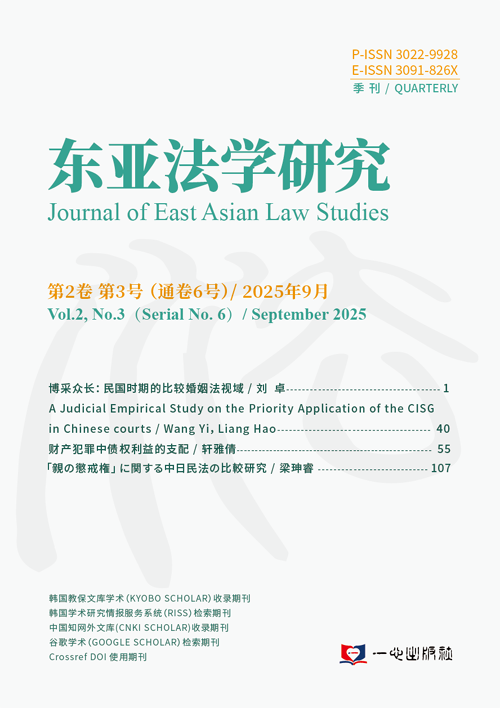- 영문명
- A Comparative Study on the “Parental Disciplinary Authority” in Chinese and Japanese Civil Law
- 발행기관
- YIXIN 출판사
- 저자명
- Shenrui Liang
- 간행물 정보
- 『Journal of east Asian law studies』Vol.2 No.3, 107~118쪽, 전체 12쪽
- 주제분류
- 사회과학 > 교육학
- 파일형태
- 발행일자
- 2025.09.30
4,240원
구매일시로부터 72시간 이내에 다운로드 가능합니다.
이 학술논문 정보는 (주)교보문고와 각 발행기관 사이에 저작물 이용 계약이 체결된 것으로, 교보문고를 통해 제공되고 있습니다.

국문 초록
The voice of today’s society for the protection of minors’ rights and interests is becoming higher and higher. An object of duty opposite to a minor, i.e., a guardian of a minor, supervises, takes care, and disciplines a child, both of the rights and duties. In such an environment, China and Japan are increasingly interested in the rights of parents. Laws and regulations are continually improving to regulate parents’ ways to discipline and educate children. In Japanese society, it is shown that the punishment of corporal punishment for children is widely recognized and is common practice. Because the traditional law of Japan is influenced by the civil law such as France, “the right of parents’ discipline” is clearly stated in the article of the Japanese civil code. However, it has become increasingly obsolete in Japan that the character of “the right to discipline” has been removed after the revision of the civil code. On the other hand, the law which is effective in present China does not clearly define the word “the right to parents”. China’s “right to parents” is only a theoretical concept. The law pointed out that parents’ education for children is a legal obligation, based on this indefinite provision. Chinese parents on the discipline of minors have an abuse of discipline. It also has a relatively clear impact on the growth of Chinese minors. The purpose of this paper is to analyze the historical development and the present state of “the right to parents” in the Chinese civil code. In this paper, we compare the provisions on the right to parents' discipline in China and Japan and the current state of education for parents' discipline in Japan and China. In this way, we will explore the necessity of improving “theright to parents” for the establishment of the law in Japan and the social development. Through the comparative analysis, it is proposed that “the right to parents” should be specified in the light of the sentence, and it is necessary to specify the concept, the method of exercise, the scope, and the responsibility in particular.
영문 초록
未成年者の権利と利益の保護に対する今日の社会の声はますます高くなっている。未成年者とは反対の義務の対象、すなわち未成年者の保護者は、子供を監督し、世話をし、そして懲戒し、それは権利と義務の両方である。このような環境の中で、中国と日本の社会は親のしつけの権利にますます関心を寄せている。親が子供をしつけ、教育する方法を規制するために法律や規制を絶えず改善している。日本社会において、子どもの体罰のしつけが広く認識されており、また一般的な慣行であることを示している。日本の伝統民法では、フランスなどの民法の影響を受けているため、「親の懲戒権」はあくまでも日本民法の条文に明記されている。が、何度かの民法改正を経て、現在、「懲戒権」の文字は削除されている、日本の「親の懲戒権」に関する規定はますます不明瞭になっている。一方、現在の中国で有効な法律には「親の懲戒権」という言葉を明確に規定していない。中国の「親の懲戒権」は理論的な概念にすぎない。法律は、この不明確な規定に基づいて、子供のための親の教育は法的義務であると指摘した。未成年者の懲戒に対する中国の親からは懲戒権の乱用現象が見られる。また中国の未成年者の成長に比較的明らかな悪影響を及ぼしている。本稿の目的は,中日民法における「親の懲戒権」の歴史的展開と現状を比較分析し,相互参考意義を導き出し,両民法における「親の懲戒権」の規定に対して比較的最適な解決策を提案することである。本稿では、中国と日本の「親の懲戒権」に関する規定と、日中の親の懲戒教育の現状を比較する。これにより、日中の法律確立と社会発展のための「親の懲戒権」の向上の必要性を、文献の読解とデータ分析を通じて5 つの章から分析探求する。比較分析を通じて、「親の懲戒権」は明文で規定すべきで、しかもその概念、行使方式、範囲、責任を含んで具体的に規定する必要があると提案する。
목차
Ⅰ. 序章
Ⅱ. 中国と日本における「親の懲戒権」の歴史
Ⅲ. 中国と日本の民法における「親の懲戒権」の分析
Ⅳ. 中日民法の「親の懲戒権」の相互参考意義と制度確立
Ⅴ. 終章
参考文献
해당간행물 수록 논문
- Journal of east Asian law studies Vol.2 No.3 Contents
- 博采众长:民国时期的比较婚姻法视域
- 新时代“枫桥经验”视域下民事案件诉前调解功能异化风险分析
- 疑案裁判逆向推导的法理基础及其解决路径
- Research on the Priority Application of the CISG
- 财产犯罪中债权利益的支配
- 互联网平台数据权益保护的困境与法治路径
- 超大型平台数据共享的强制缔约义务研究
- 功能主义视角下中国-东盟检察合作机制的建构与演进(2004-2025):以总检察长会议为核心
- 「親の懲戒権」に関する中日民法の比較研究
- Building a Legal Framework for Regulating Rural Land Circulation Prices in China to Ensure Food Security
관련논문
사회과학 > 교육학분야 BEST
- 학업적 자기효능감 척도 개발 및 타당화 연구
- 제4차 산업혁명시대의 인간상과 교육의 방향 및 제언
- 미국 고교학점제의 특징과 한국 고교학점제 시행을 위한 정책적 시사점: 노스캐롤라이나 주의 운용 사례를 중심으로
최근 이용한 논문
교보eBook 첫 방문을 환영 합니다!

신규가입 혜택 지급이 완료 되었습니다.
바로 사용 가능한 교보e캐시 1,000원 (유효기간 7일)
지금 바로 교보eBook의 다양한 콘텐츠를 이용해 보세요!



